IELTS TUTOR cung cấp 🔥The Pirahã people of Brazil Answers with location - Đề luyện IELTS READING- Làm bài online format computer-based, kèm đáp án, dịch & giải thích từ vựng - cấu trúc ngữ pháp khó
I. Kiến thức liên quan
II. Làm bài online (kéo xuống cuối bài blog để xem giải thích từ vựng & cấu trúc cụ thể hơn)
📩 MN AI CHƯA CÓ ĐÁP ÁN FORECAST QUÝ MỚI PART 1-2-3 NHẮN ZL 0905834420 IELTS TUTOR GỬI FREE HẾT NHA
III. The Pirahã people of Brazil: Đề luyện IELTS READING (IELTS Reading Practice Test)
READING PASSAGE 3
The Pirahã people of Brazil
The Pirahã language has stirred up debate among experts
A
The Pirahã live deep in Brazil's Amazon forest, and their language is hotly debated by linguists. Since 1977, the ethnologist Daniel Everett has spent a total of seven years living with the Pirahã and has committed his career to studying their puzzling speech. Indeed, he was uncertain for so long about what he was actually hearing while living among the Pirahã that he waited nearly three decades before publishing his findings.
B
The debate over the Pirahã language goes right to the core of the riddle regarding how Homo sapiens managed to develop vocal communication. Although bees dance, birds sing and whales even sing with syntax, human language is unique, if only for the reason that it enables humans to piece together never-before-constructed thoughts, and be infinitely imaginative - think of Shakespeare's plays or Einstein's theory of relativity.
C
Linguistics generally focuses on what features all human languages have in common, but the Pirahã language departs from what same academics have long maintained are essential and mallemable features of all human languages. Most of all, it may be unique for not employing subordinate clauses. Instead of saying, 'When I have finished eating, I will speak to you', the Pirahã say, 'I finish eating, I speak with you'. Equally perplexing, the Pirahã appear not to use numbers. During the time he spent with them, Everett never heard words like 'all', 'every' and 'more'. There is one word, 'hói', that comes close to the numeral 1, but it can't go more small. And they were never connected to count without language, on their fingers for example, in order to determine important tasks in village life like how many pieces of meat to grill.
D
Everett's findings among the Pirahã have brought new life to a controversial theory by the linguist Benjamin Whorf, who suggested that people are only capable of constructing thoughts for which they possess actual words. Or to put it another way, because they have no words for numbers, they cannot truly conceive of the concept of numbers. This idea, known as linguistic determinism, was largely abandoned by the 1970s, but the Pirahã have put it back on the table.>> Form đăng kí giải đề thi thật IELTS 4 kĩ năng kèm bài giải bộ đề 100 đề PART 2 IELTS SPEAKING quý đang thi (update hàng tuần) từ IELTS TUTOR
E
The Waripiri language - spoken by a group of Australian Aborigines - like that of the Pirahã, features only the most rudimentary system of counting. However, the Waripiri people had no difficulty counting further than three in a foreign language, in this case English, but when Everett attempted to teach the Pirahã how to count in Portuguese, like other Brazilians, not one of them managed to learn. Even after eight months of one-on-one tutoring, the Pirahã could not consistently get the answers right for simple sums they had successfully completed just the day before. For Everett, this was powerful evidence that the Pirahã's world is shaped by their language in a way previously thought impossible.
F
This conclusion has been fiercely contested. One of the most prominent critics is the linguist Noam Chomsky, who proposes that all human languages share a "universal grammar" – a basic, innate set of grammatical rules hardwired into the human brain. From this perspective, the Pirahã language cannot be an exception. Critics suggest that the Pirahã's inability to learn to count is a cultural choice, not a cognitive limitation imposed by their language. They argue that the Pirahã place a high cultural value on living in the present and discussing only direct, personal experience, which may render abstract concepts like numbers unnecessary.
Questions 27–32
Reading Passage 3 has six paragraphs, A–F.
Choose the correct heading for paragraphs A–F from the list of headings below.
Write the correct number, i–ix, in boxes 27–32 on your answer sheet.
List of Headings
i. A controversial claim about the influence of language
ii. The initial difficulty of linguistic research
iii. A comparison with another language group
iv. Challenging a universal theory of language
v. The unique characteristics of a language
vi. The key to human communication
vii. A failed attempt to teach a new skill
viii. A change in academic focus over time
ix. The debate over cultural influences
Paragraph A
Paragraph B
Paragraph C
Paragraph D
Paragraph E
Paragraph F
Questions 33–36
Do the following statements agree with the claims of the writer in Reading Passage 3?
In boxes 33–36 on your answer sheet, write:
YES if the statement agrees with the claims of the writer
NO if the statement contradicts the claims of the writer
NOT GIVEN if it is impossible to say what the writer thinks about this
Daniel Everett published his findings on the Pirahã language soon after he began studying it.
The Pirahã language uses a complex system of subordinate clauses.
The Pirahã were able to learn to count in Portuguese after eight months of tutoring.
Some experts believe the Pirahã's culture explains their lack of numbers.
Questions 37–40
Complete the summary using the list of words, A–G, below.>> IELTS TUTOR gợi ý tham khảo CẦN VIẾT & THU ÂM BAO NHIÊU BÀI ĐỂ ĐẠT 8.0 SPEAKING & 7.0 WRITING?
Write the correct letter, A–G, in boxes 37–40 on your answer sheet.
The Pirahã language has caused significant debate in the field of linguistics. Daniel Everett's research suggests the language lacks numbers and 37 ......................., which challenges the idea that all languages share a common structure. His findings support the theory of 38 ......................., proposed by Benjamin Whorf, which had been largely dismissed. However, other linguists, such as Noam Chomsky, argue for the existence of a 39 ....................... that all humans are born with. These critics propose that the Pirahã's avoidance of numbers is not a linguistic limitation, but rather a 40 ....................... rooted in their cultural values.
| A | cultural choice |
| B | universal grammar |
| C | linguistic determinism |
| D | subordinate clauses |
| E | vocal communication |
| F | cognitive limitation |
| G | direct experience |
IV. Dịch bài đọc The Pirahã people of Brazil
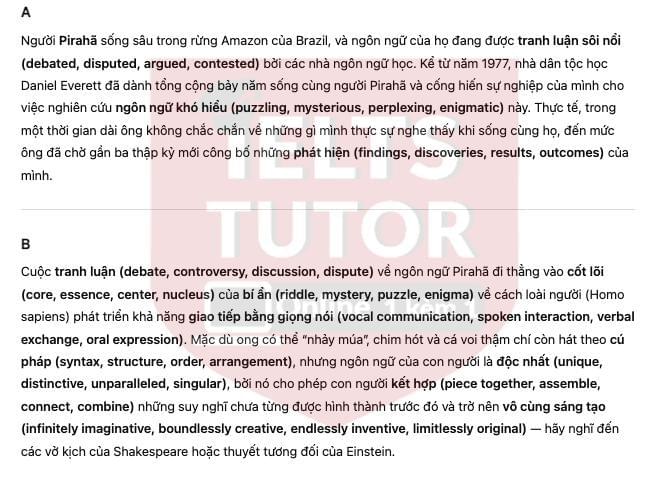
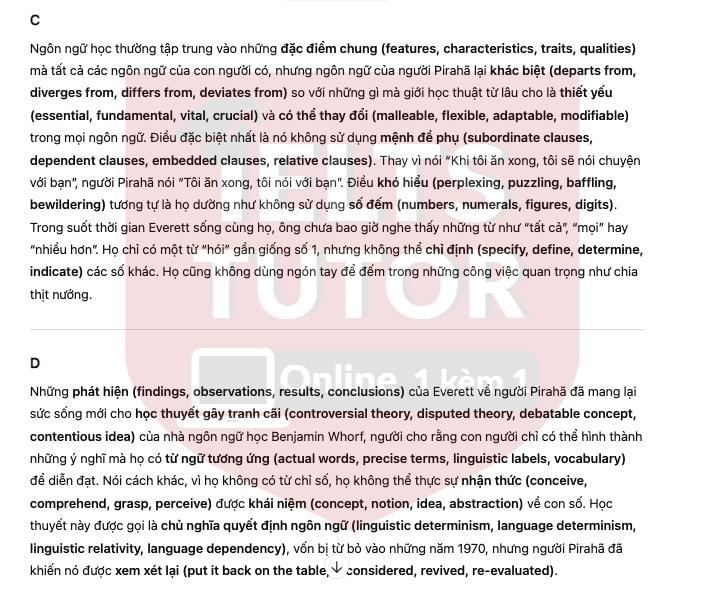
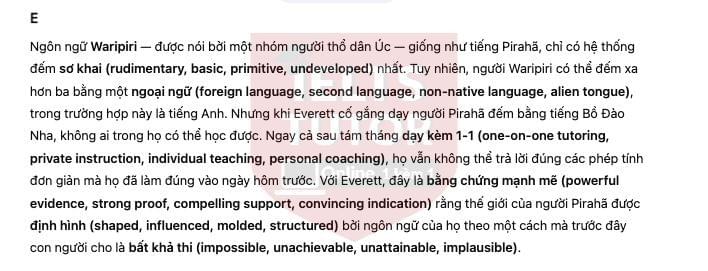
V. Giải thích từ vựng The Pirahã people of Brazil
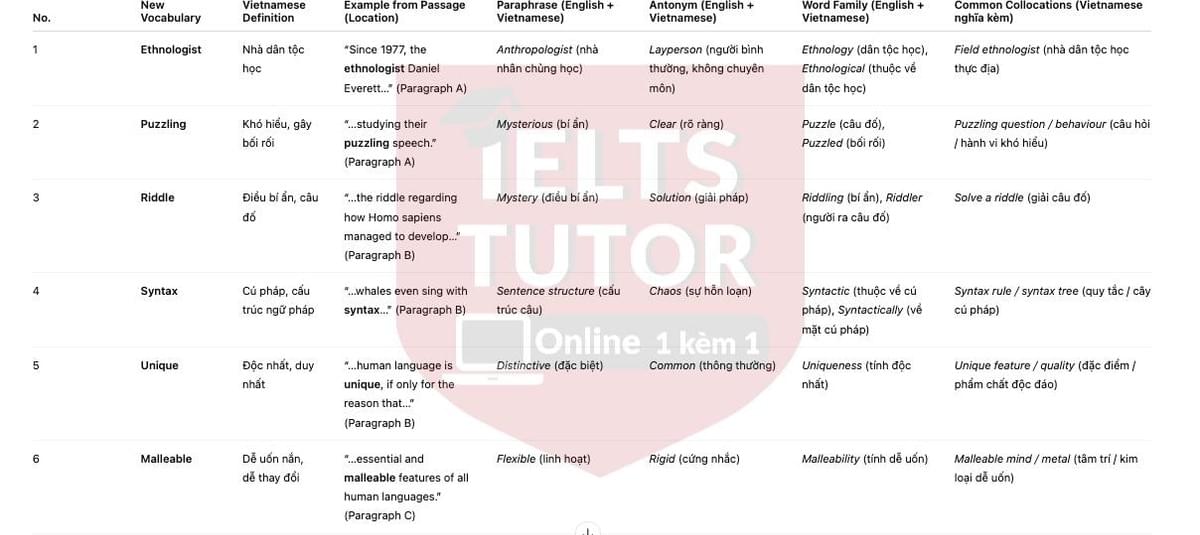
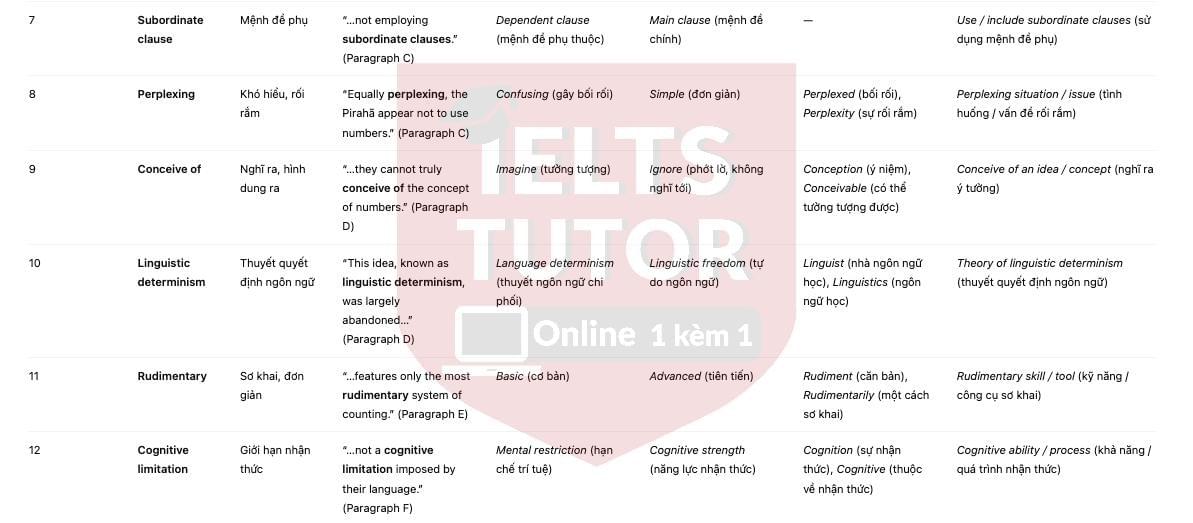

VI. Giải thích cấu trúc ngữ pháp khó The Pirahã people of Brazil
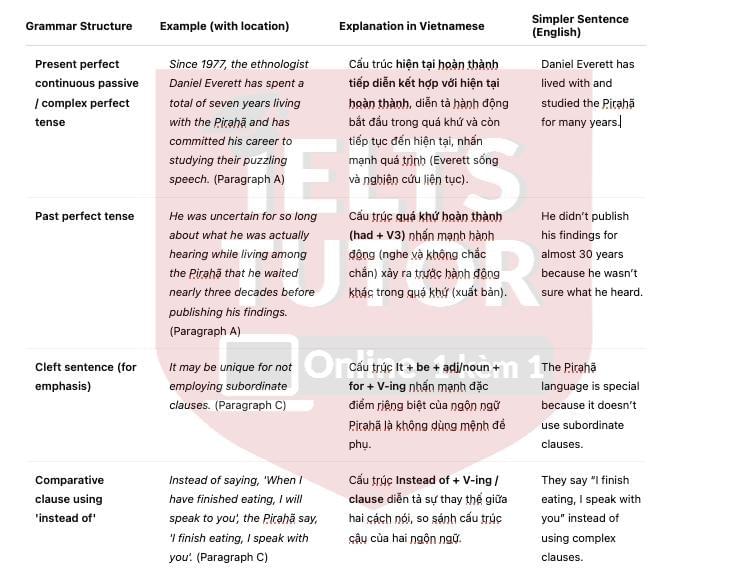
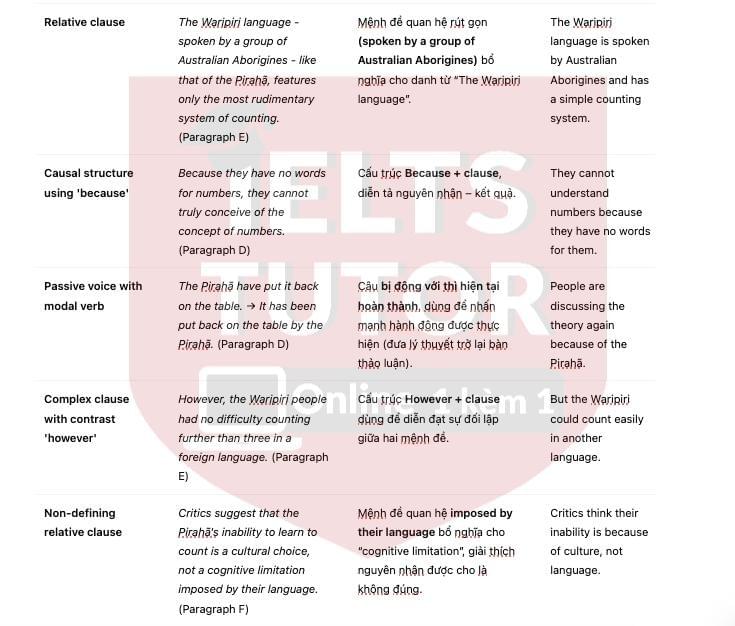
VII. Đáp án The Pirahã people of Brazil
ii
vi
v
i
iii
iv
NO
NO
NO
YES
D
C
B
A
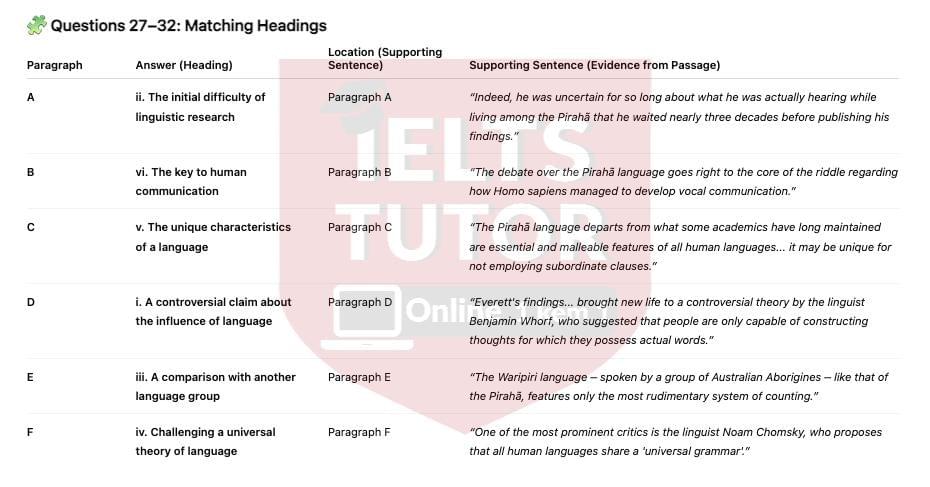
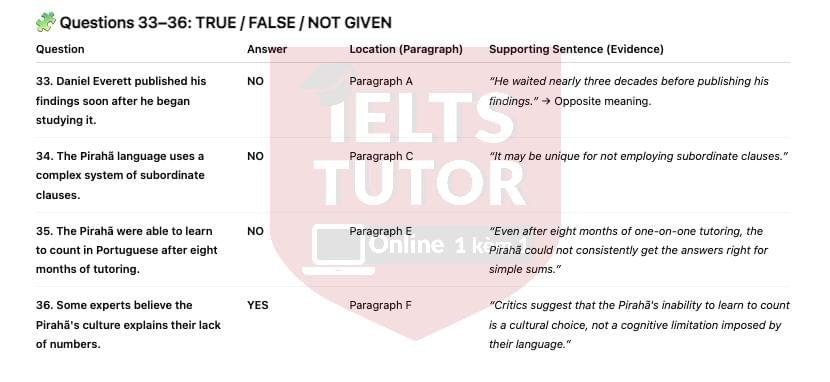
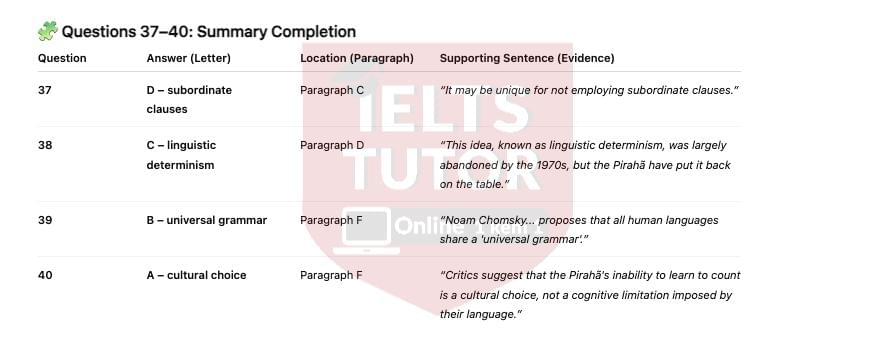
📩 MN AI CHƯA CÓ ĐÁP ÁN FORECAST QUÝ MỚI PART 1-2-3 NHẮN ZL 0905834420 IELTS TUTOR GỬI FREE HẾT NHA

Các khóa học IELTS online 1 kèm 1 - 100% cam kết đạt target 6.0 - 7.0 - 8.0 - Đảm bảo đầu ra - Thi không đạt, học lại FREE
>> Thành tích học sinh IELTS TUTOR với hàng ngàn feedback được cập nhật hàng ngày



